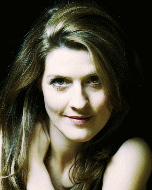"Four Last Songs" a performance in Edinburgh

"Four Last Songs" by Richard Strauss was performed by the Edinburgh Symphony and Catriona Clark (pictured) last Saturday. I must admit I was not familiar with the work prior to this concert and pleasantly surprised by the beauty of the music. Although not a fan of Strauss - and not sure this concert necessarily changed that opinion - there were certainly some moments of note, elements I can take on board as a composer.
The pieces showed a variety of different tonal colors, although occasionally I thought the orchestration was a bit over lush - but that tends to be my impression of Strauss. The dark thematic nature of the work allowed the orchestra to play with some rich harmonies and feature some of the instruments in the low ranges - which was nice. There was also some interesting use of the timpani giving color, accent and shape throughout the piece, otherwise, very little percussion. Catriona's voice matches the music well. Unfortunately, the acoustics of the hall didn't allow her to always come over the orchestra. At some points of the piece the orchestra was playing quietly, yet the reverberation of the hall still kept the accompaniment over-riding the vocalist.
In my own writing I am ever aware of the vocalist and what the accompaniment is doing. Occasionally their may not be enough beneath the lyrics to give depth to the what the vocalist is singing, but the words should always be at forefront - at least in what I'm writing at the present. There is one point in the opera "It Must Be Fate" where the words become repetitive to the point they are just another instrument in the mix, but that is a rare moment - and only there when the words have already been heard so the creation of sound becomes the tool of communication. In the Strauss, I didn't feel there were sections that were repeated to the point the words became "sound" and so hearing the words needed to be more than just the sound of the vocalisation in the mix of the music.
It was an enjoyable concert, certainly a time of relaxation in midst of all the other preparations I am going through.

Comments
We played this piece two years ago here in the Symphony Orchestra and it is an experience I won't soon forget!
Thank you for your kind comments, though. Sorry to hear the acoustic made us swamp the soloist: I'll pass that on.
Also sorry to hear you don't like Strauss. His music isn't the kind of stuff to over-intellectualise about: it's music to be submerged in. You want a good wallow, you go to R Strauss. (Or Mahler, of course.) And boy, does he write great tunes (especially for the horns - his dad was a horn player). Think of the "Summit" in the Alpine Symphony (which the whole orchestra gets), or the baby's theme in the Sinfonia Domestica making its final appearance as baby's breakfast-time tantrum on eight unison horns going full blast.
Having said his music isn't really head-food, the one piece of his I can guarantee will be in the Classic FM top 300 is Also Sprach Zarathustra. Now I know that's because of Stanley Kubrick (plus the BBC used it for all their Apollo programme coverage), but that is a piece which is actually all about key relationships (and one of the few such pieces where an audience is likely to spot the fact for themselves, at the very end at least).
But the concert made me rethink my attitudes about Strauss, worth a re-listen - or a more attentive listen as I am sure there are a number of his works that I could learn something from. I love a good melody and it's an element I need to improve in my own music.